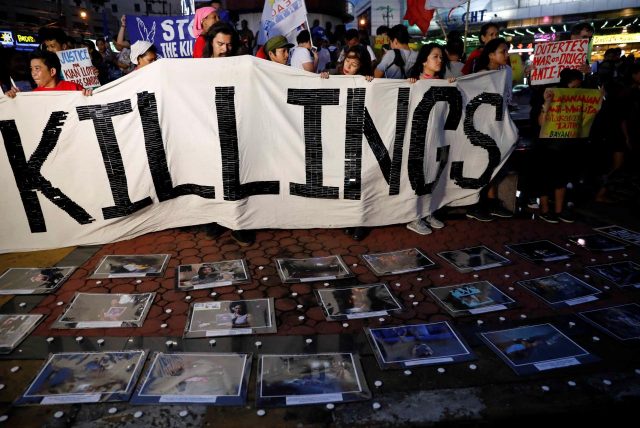
Police officers accompanied by community officials were seen going to houses asking residents if they were willing to submit urine samples.
MANILA – Police were knocking on doors in one of Manila’s poorest neighborhoods on Wednesday to encourage people to take on-the-spot drug tests, a campaign condemned by rights groups as harassment that could endanger lives.
Carrying drug testing kits, police officers accompanied by community officials were seen by Reuters going to houses asking residents if they were willing to submit urine samples.
Payatas, one of the most populated sub-districts, or barangays, in the capital’s Quezon City neighborhood, has been identified as a crime-prone area with a serious drug problem. Community leaders said they requested help from police, and testing was voluntary.
Dozens of Payatas residents have died during President Rodrigo Duterte’s ferocious 14-month-old war on drugs, which has killed thousands of Filipinos, many in what critics say are suspicious circumstances.
Residents say more than 300 of the 130,000 people in Payatas are already on a drug “watch list” drawn up last year by community leaders of known addicts.
Barangay watch lists are drawn up by community leaders to identify those in need of rehabilitation, but activists say some of those who appeared on them have become targets for assassination. The authorities deny the watch lists serve as hit-lists.
On Wednesday, Reuters saw a small number of Payatas residents lining up to be tested but the police did not say how many were found clean or to be drug users. Community leaders did not say what will happen to people who tested positive for drug use or to those who refuse to be tested.
“Our goal is to have a drug-free barangay this year,” Payatas barangay secretary Marlene Ocampo told Reuters, adding the village council agreed to fund and conduct free and voluntary drug testing, which could take four to five months.
“We only asked the police to help us and we are grateful,” she said. “We have more than 133,000 residents.”
She said there were no complaints, and many residents agreed to undergo tests.
“This is also good for us,” said Maria Luisa Valdez, a 37-year-old food vendor. “We are clean. We don’t do drugs so why would we be afraid to take the test?”
The head of the National Union of People’s Lawyers, Edre Olalia, said police were on a “fishing expedition” to draw up a list of drug users, and doubted the testing was voluntary.
‘ANTI-POOR’
“It is presumably illegal and unconstitutional on its face especially when it is blanket, involuntarily and arbitrary,” Olalia said. “It violates the right to privacy and against self-incrimination and basic human dignity.”
“It is anti-poor and discriminatory,” he added.
Human rights groups stress that Duterte’s crackdown has overwhelmingly targeted the poor, and those killed are mainly drug users or low-level pushers from families with no resources to challenge official police accounts.
Quezon City police chief Guillermo Eleazar said the tests were limited to Payatas and police were only helping the community.
“These tests are voluntary,” Eleazar told Reuters. “We are not forcing anyone to do it, that is illegal and we will not allow it.”
The drugs war has once again been thrust into the spotlight after more than 90 people were killed last week during three nights of coordinated “One-Time, Big-Time” anti-crime operations.
The operations stopped when news broke that a 17-year-old high school student, Kian Loyd Delos Santos, was shot dead by police in a northern suburb of Manila, sparking public anger that prompted Duterte to order the officers be detained and investigated.
Police say Delos Santos was a drug courier who was armed and resisted arrest, but his family insists he had no involvement in narcotics and was murdered in cold blood.
Click and watch the video report of News5’s Bev Verdera below:



